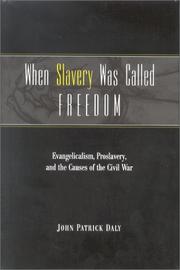| Listing 1 - 2 of 2 |
Sort by
|

ISBN: 0813158516 0813170281 9780813170282 9780813158518 0813122414 9780813122410 9780813190938 0813190932 Year: 2002 Publisher: Lexington University Press of Kentucky
Abstract | Keywords | Export | Availability | Bookmark
 Loading...
Loading...Choose an application
- Reference Manager
- EndNote
- RefWorks (Direct export to RefWorks)
When Slavery Was Called Freedom uncovers the cultural and ideological bonds linking the combatants in the Civil War era and boldly reinterprets the intellectual foundations of secession. John Patrick Daly dissects the evangelical defense of slavery at the heart of the nineteenth century's sectional crisis. He brings a new understanding to the role of religion in the Old South and the ways in which religion was used in the Confederacy.Southern evangelicals argued that their unique region was destined for greatness, and their rhetoric gave expression and a degree of coherence to the grassroots
Antislavery movements --- Southern States --- Evangelicalism --- Slavery --- Evangelical religion --- Protestantism, Evangelical --- Evangelical Revival --- Fundamentalism --- Pietism --- Protestantism --- Abolition of slavery --- Antislavery --- Enslavement --- Mui tsai --- Ownership of slaves --- Servitude --- Slave keeping --- Slave system --- Slaveholding --- Thralldom --- Crimes against humanity --- Serfdom --- Slaveholders --- Slaves --- History --- Moral conditions. --- Intellectual life. --- Political aspects --- Justification. --- Moral and ethical aspects --- United States --- Causes. --- Politics and government --- Enslaved persons
Book
ISBN: 9780820361918 0820361917 9780820361895 0820361895 9780820361901 0820361909 Year: 2022 Publisher: Athens
Abstract | Keywords | Export | Availability | Bookmark
 Loading...
Loading...Choose an application
- Reference Manager
- EndNote
- RefWorks (Direct export to RefWorks)
"The War after the War is lively military history and overview of Reconstruction. It illuminates the new war fought immediately after the American Civil War. This Southern Civil War was distinct from the American Civil War and fought between southerners for control of state governments. In the South, African American and white unionists formed a successful biracial coalition that elected state and local officials. Sadly, white supremacist insurrectionaries won the Southern Civil War and overthrew democratically elected governments. White supremacist terror, guerilla, and paramilitary groups attacked these biracial coalitions. The Ku Klux Klan was the most infamous of these groups but ex-Confederates extremists fought democratic change in the region under many guises. The biracial coalition put up a brave fight against these insurrectionary forces. The federal government, however, offered the biracial forces little help. After dozens of battles and tens of thousands of casualties between 1865 and 1877, the Southern Civil War ended in the complete triumph of extremist insurrection and white supremacy. As the United States marks the 150th anniversary of the Southern Civil War, its lessons are more vital than ever. 'Reconstruction' is a misnomer, it should be taught and remembered as the civil war it was"--
Reconstruction (U.S. history, 1865-1877) --- White supremacy movements --- History --- Southern States
| Listing 1 - 2 of 2 |
Sort by
|

 Search
Search Feedback
Feedback About UniCat
About UniCat  Help
Help News
News